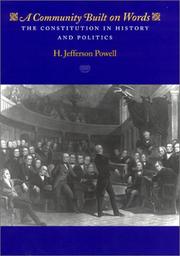| Listing 1 - 4 of 4 |
Sort by
|
Book
Year: 2002 Publisher: [Bozeman Montana Fish, Wildlife & Parks
Abstract | Keywords | Export | Availability | Bookmark
 Loading...
Loading...Choose an application
- Reference Manager
- EndNote
- RefWorks (Direct export to RefWorks)
Fishes --- Fishing surveys --- Migration --- Parasites --- Rainbow trout --- Whirling disease --- Madison River (Wyo. and Mont.) --- Montana
Book
Year: 2002 Publisher: Bozeman, Mont Montana Fish, Wildlife and Parks
Abstract | Keywords | Export | Availability | Bookmark
 Loading...
Loading...Choose an application
- Reference Manager
- EndNote
- RefWorks (Direct export to RefWorks)
Fish stock assessment --- Fisheries --- Fishery management --- Fishing surveys --- Gallatin River Watershed --- Gallatin River Watershed (Wyo. and Mont.) --- Madison River Watershed --- Madison River Watershed (Wyo. and Mont.) --- Montana --- United States
Book
ISBN: 0674010124 Year: 2002 Publisher: Cambridge, Ma ; London : Harvard University Press,
Abstract | Keywords | Export | Availability | Bookmark
 Loading...
Loading...Choose an application
- Reference Manager
- EndNote
- RefWorks (Direct export to RefWorks)
Etnische groepen --- Rassenvraagstukken --- Verenigde Staten --- 20ste eeuw. --- Cohalan, Daniel F. --- Du Bois, W. E. B. --- Grant, Madison, --- Toomer, Jean, --- Ethnicity --- United States --- History --- 20th century --- Race relations --- Ethnic relations --- Intellectual life --- Du Bois, William Edward Burghardt --- Views on race --- Toomer, Jean --- Race awareness --- Grant, Madison

ISBN: 1282537318 9786612537318 0226677222 9780226677224 9780226677231 0226677230 9781282537316 6612537310 Year: 2002 Publisher: Chicago University of Chicago Press
Abstract | Keywords | Export | Availability | Bookmark
 Loading...
Loading...Choose an application
- Reference Manager
- EndNote
- RefWorks (Direct export to RefWorks)
H. Jefferson Powell offers a powerful new approach to one of the central issues in American constitutional thinking today: the problem of constitutional law's historicity, or the many ways in which constitutional arguments and outcomes are shaped both by historical circumstances and by the political goals and commitments of various actors, including judges. The presence of such influences is often considered highly problematic: if constitutional law is political and historical through and through, then what differentiates it from politics per se, and what gives it integrity and coherence? Powell argues that constitutional theory has as its (sometimes hidden) agenda the ambition of showing how constitutional law can escape from history and politics, while much constitutional history seeks to identify an historically true meaning of the constitutional text that, once uncovered, can serve as a corrective to subsequent deviations from that truth. Combining history and theory, Powell analyzes a series of constitutional controversies from 1790 to 1944 to demonstrate that constitutional law from its very beginning has involved politically charged and ideologically divisive arguments. Nowhere in our past can one find the golden age of apolitical constitutional thinking that a great deal of contemporary scholarship seeks or presupposes. Viewed over time, American constitutional law is a history of political dispute couched in constitutional terms. Powell then takes his conclusions one step further, claiming that it is precisely this historical tradition of argument that has given American constitutional law a remarkable coherence and integrity over time. No matter what the particular political disputes of the day might be, constitutional argument has provided a shared language through which our political community has been able to fight out its battles without ultimately fracturing. A Community Built on Words will be must reading for any student of constitutional history, theory, or law.
Constitutional law --- Constitutional history --- United States --- Politics and government. --- Government --- History, Political --- constitution, law, historicity, living document, originalism, judges, supreme court, history, theory, foreign affairs power, jefferson, national bank, interpretation, sovereignty, judiciary, kamper v hawkins, sedition act, marshall, paterson, religion, slavery, politics, nonfiction, brandeis, holmes, railroad, clay may, citizenship, supremacy, mann, dissent, madison, veto, separation of powers, legislation, hudgins wright, turpin locket.
| Listing 1 - 4 of 4 |
Sort by
|

 Search
Search Feedback
Feedback About UniCat
About UniCat  Help
Help News
News